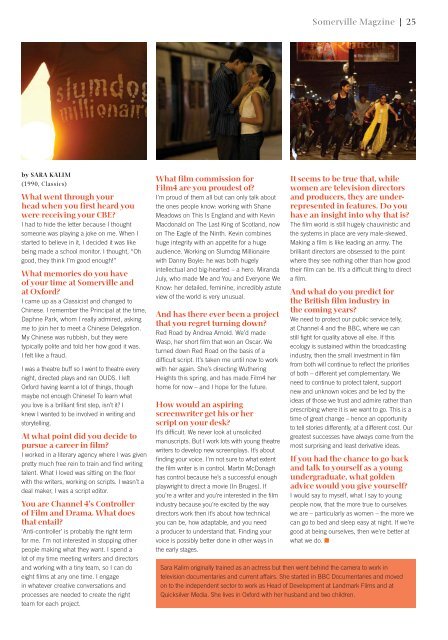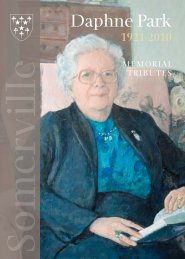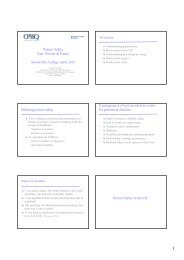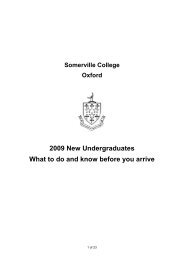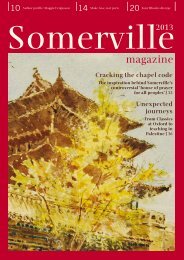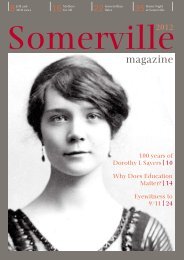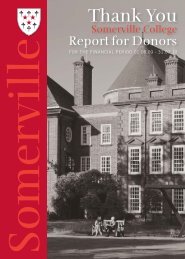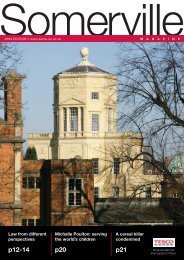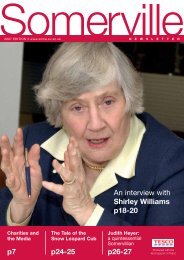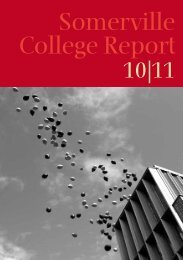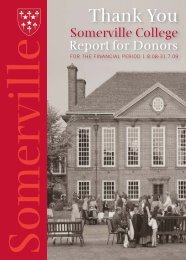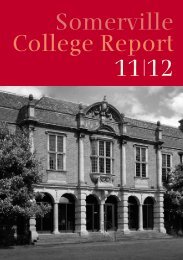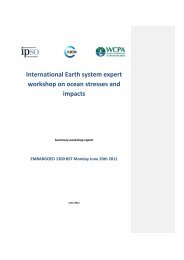magazine - Somerville College - University of Oxford
magazine - Somerville College - University of Oxford
magazine - Somerville College - University of Oxford
You also want an ePaper? Increase the reach of your titles
YUMPU automatically turns print PDFs into web optimized ePapers that Google loves.
<strong>Somerville</strong> Magzine | 25<br />
by SARA KALIM<br />
(1990, Classics)<br />
What went through your<br />
head when you first heard you<br />
were receiving your CBE?<br />
I had to hide the letter because I thought<br />
someone was playing a joke on me. When I<br />
started to believe in it, I decided it was like<br />
being made a school monitor. I thought, “Oh<br />
good, they think I’m good enough!”<br />
What memories do you have<br />
<strong>of</strong> your time at <strong>Somerville</strong> and<br />
at <strong>Oxford</strong>?<br />
I came up as a Classicist and changed to<br />
Chinese. I remember the Principal at the time,<br />
Daphne Park, whom I really admired, asking<br />
me to join her to meet a Chinese Delegation.<br />
My Chinese was rubbish, but they were<br />
typically polite and told her how good it was.<br />
I felt like a fraud.<br />
I was a theatre buff so I went to theatre every<br />
night, directed plays and ran OUDS. I left<br />
<strong>Oxford</strong> having learnt a lot <strong>of</strong> things, though<br />
maybe not enough Chinese! To learn what<br />
you love is a brilliant first step, isn’t it? I<br />
knew I wanted to be involved in writing and<br />
storytelling.<br />
At what point did you decide to<br />
pursue a career in film?<br />
I worked in a literary agency where I was given<br />
pretty much free rein to train and fi nd writing<br />
talent. What I loved was sitting on the fl oor<br />
with the writers, working on scripts. I wasn’t a<br />
deal maker, I was a script editor.<br />
You are Channel 4’s Controller<br />
<strong>of</strong> Film and Drama. What does<br />
that entail?<br />
‘Anti-controller’ is probably the right term<br />
for me. I’m not interested in stopping other<br />
people making what they want. I spend a<br />
lot <strong>of</strong> my time meeting writers and directors<br />
and working with a tiny team, so I can do<br />
eight fi lms at any one time. I engage<br />
in whatever creative conversations and<br />
processes are needed to create the right<br />
team for each project.<br />
What film commission for<br />
Film4 are you proudest <strong>of</strong>?<br />
I’m proud <strong>of</strong> them all but can only talk about<br />
the ones people know: working with Shane<br />
Meadows on This Is England and with Kevin<br />
Macdonald on The Last King <strong>of</strong> Scotland, now<br />
on The Eagle <strong>of</strong> the Ninth. Kevin combines<br />
huge integrity with an appetite for a huge<br />
audience. Working on Slumdog Millionaire<br />
with Danny Boyle: he was both hugely<br />
intellectual and big-hearted – a hero. Miranda<br />
July, who made Me and You and Everyone We<br />
Know: her detailed, feminine, incredibly astute<br />
view <strong>of</strong> the world is very unusual.<br />
And has there ever been a project<br />
that you regret turning down?<br />
Red Road by Andrea Arnold. We’d made<br />
Wasp, her short fi lm that won an Oscar. We<br />
turned down Red Road on the basis <strong>of</strong> a<br />
diffi cult script. It’s taken me until now to work<br />
with her again. She’s directing Wuthering<br />
Heights this spring, and has made Film4 her<br />
home for now – and I hope for the future.<br />
How would an aspiring<br />
screenwriter get his or her<br />
script on your desk?<br />
It’s difficult. We never look at unsolicited<br />
manuscripts. But I work lots with young theatre<br />
writers to develop new screenplays. It’s about<br />
finding your voice. I’m not sure to what extent<br />
the film writer is in control. Martin McDonagh<br />
has control because he’s a successful enough<br />
playwright to direct a movie (In Bruges). If<br />
you’re a writer and you’re interested in the film<br />
industry because you’re excited by the way<br />
directors work then it’s about how technical<br />
you can be, how adaptable, and you need<br />
a producer to understand that. Finding your<br />
voice is possibly better done in other ways in<br />
the early stages.<br />
It seems to be true that, while<br />
women are television directors<br />
and producers, they are underrepresented<br />
in features. Do you<br />
have an insight into why that is?<br />
The fi lm world is still hugely chauvinistic and<br />
the systems in place are very male-skewed.<br />
Making a fi lm is like leading an army. The<br />
brilliant directors are obsessed to the point<br />
where they see nothing other than how good<br />
their fi lm can be. It’s a diffi cult thing to direct<br />
a fi lm.<br />
And what do you predict for<br />
the British film industry in<br />
the coming years?<br />
We need to protect our public service telly,<br />
at Channel 4 and the BBC, where we can<br />
still fight for quality above all else. If this<br />
ecology is sustained within the broadcasting<br />
industry, then the small investment in film<br />
from both will continue to reflect the priorities<br />
<strong>of</strong> both – different yet complementary. We<br />
need to continue to protect talent, support<br />
new and unknown voices and be led by the<br />
ideas <strong>of</strong> those we trust and admire rather than<br />
prescribing where it is we want to go. This is a<br />
time <strong>of</strong> great change – hence an opportunity<br />
to tell stories differently, at a different cost. Our<br />
greatest successes have always come from the<br />
most surprising and least derivative ideas.<br />
If you had the chance to go back<br />
and talk to yourself as a young<br />
undergraduate, what golden<br />
advice would you give yourself?<br />
I would say to myself, what I say to young<br />
people now, that the more true to ourselves<br />
we are – particularly as women – the more we<br />
can go to bed and sleep easy at night. If we’re<br />
good at being ourselves, then we’re better at<br />
what we do. ■<br />
Sara Kalim originally trained as an actress but then went behind the camera to work in<br />
television documentaries and current affairs. She started in BBC Documentaries and moved<br />
on to the independent sector to work as Head <strong>of</strong> Development at Landmark Films and at<br />
Quicksilver Media. She lives in <strong>Oxford</strong> with her husband and two children.


